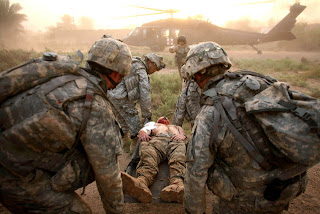
When i read the poem "Immigrants in Our Own Land" By Jimmy Santiago Baca, I felt like I knew the writer, like I was related to him somehow and he was telling me what it was like to come as an immigrant to this country. I felt this way because alot of my family, including my parents, were once immigrants here too. When I read the first lines of the poem, it immediately reminded me of what my dad used to tell me when i asked him why he had come here. Baca said that, "We are born with dreams in our hearts,/ looking for better days ahead" ( lines 1-2). I remember my dad telling me that he came looking for a better life, to make something of himself, to be able to give us a better life. But like Baca states in his poem, "We came here to get away from false promises,/ But it's no different here" (lines 33 and 38). My dad would tell me how when everyone first came here, none of them planned on staying, but they just wanted to make some money so that they could go back to their country and live a better life over there. But that rarely happened. The weeks tuned into months, which then turned into years. After a while, they had kids here, so they had to stay so they could go to school and make something of themselves. They wanted their children to get an education so that they could have better lives than their parents. But thats not always the case either. Like Baca says, "Some of the younger ones will become gangsters,/ Some will die and others will go on living" (lines 62-63). I have heard many immigrants say that they wish they could be back in their own country, that they miss their families and their friends back home. They miss the simple lifestile that they had before coming to this country. Now, all they do is work to live and live to work. They can't stop working or else they wont make it. They are tired and worn out, and they wish that they could just drop everything and go back home. Like Baca states in his poem, " As they look at themselves, so long gone from their families,/ so long gone from life itself, so many things have changed" (lines 69-70).
Another poem that made me think was "Photograph from September 11" by Wislawa Szymborska. The way she described the last moments of those who jumped to their deaths from the twin towers really gave me a different view of the incident. It made me wonder how hard it must have been and how desperate the people got, to the point that they had to choose between dying inside the buildings or jumping out and falling to their death. How does a person make a decision like that? I cant imagine what went through their minds before they jumped out. They decided that it would be less painful and traumatic to jump out and die instantly when they hit the ground than 2 die slowly and painfully as the flames consumed them or by asphyxiation due to all the smoke. Szymborska paints a vivid picture as she describes the way they looked as they fell to their deaths. And she ends it very respectully when she says that, " I can do only two things for them-/describe this flight/ and not add a last line" ( Szymborska, lines 17-19). I like that she ends it this way because by doing so, she shows them respect by commemorating those who died, and by not describing the scene that occurred when they hit the ground.
Heres a link to a page with other good poems on immigration. http://www.helium.com/knowledge/75180-poetry-immigration
And this is where i got the picture. http://queens.ny1.com/content/ny1_living/121151/free-programs-from-state-labor-department-help-out-immigrant-workers





